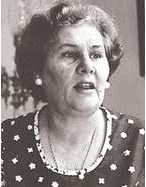
Back كارمن كاسكو دي لارا كاسترو Arabic Carmen Casco de Lara Castro Spanish Carmen Casco de Lara Castro HIF Каско де Лара Кастро, Кармен Russian
Carmen Casco de Lara Castro | |
|---|---|
 | |
| Born | Carmen Elida de Jesus Casco Miranda 17 June 1918 |
| Died | 8 May 1993 (aged 74) Asunción, Paraguay |
| Other names |
|
| Occupations |
|
| Years active | 1939–1993 |
| Known for | Establishing one of the first independent human rights investigatory organizations in Latin America |
Carmen Casco de Lara Castro (17 June 1918 – 8 May 1993) was a Paraguayan teacher, women's and human rights advocate, and politician. She established one of the first independent human rights organizations in Latin America and fought for both women's equality and an end to state-sponsored terrorism under the dictatorship of Alfredo Stroessner. She was influential in passing legislation for pay equity and maternity rights, as well as securing the repeal of laws curtailing basic human rights.
Born into an influential family, Casco was educated as a teacher and taught from the end of the 1930s to 1965. Having relatives sent into exile and witnessing the devastation of two wars, she was propelled into working to alleviate the suffering of those who were more marginalized than she. Initially she began working on issues involving women and political prisoners. When elected to serve on the 1967 Constitutional Assembly, she worked to have basic human rights added to the Paraguayan Constitution. One of the founders of the Commission for the Defense of Human Rights of Paraguay, she became its president and served in that capacity until her death. Unable to prosecute those who abused others' liberties, the organization focused on providing aid to victims but also compiled information on those who had been forcibly "disappeared".
Elected as a member of the Chamber of Deputies in 1968, Casco was an outspoken opponent of the dictatorial regime and was the target of state surveillance, imprisonment and intimidation. She served until 1977, when she resigned in protest to an amendment of the Constitution which allowed Stroessner unlimited terms as president. She was one of the parties involved in securing the release of political prisoners from the Ambush Concentration Camp. Throughout the 1980s, she traveled extensively trying to make the international community aware of human rights abuses in Paraguay so that they could apply pressure on the government to end reprisals against citizens. When Stroessner was ousted in 1989, she was elected as a Senator, serving in that capacity for the rest of her life. In 1992, when the archives of the Central Police Department of Investigations, known as the Terror Files, were unearthed, she became president of the Senate investigation into the records. The commission discovered that the Technical Affairs Department of the Ministry of the Interior was still operating and shut it down. That same year, she was honored by the United Nations for her contributions to human rights and humanity.
Casco died in 1993 and is remembered for her record of defending human rights. Schools and monuments in Paraguay bear her name, and her likeness adorns a stamp issued by the Paraguayan government in 2000.